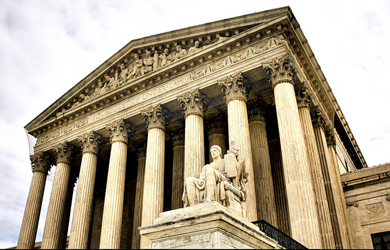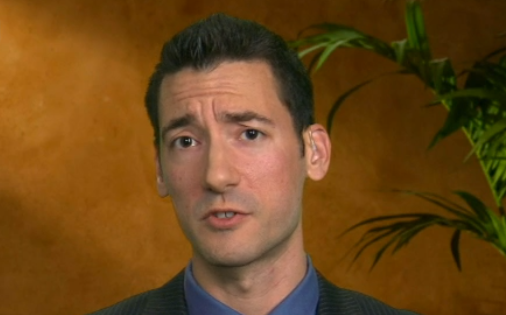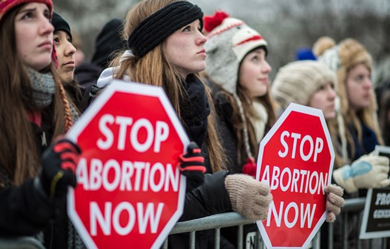Last weekend, about 500 anti-abortion activists — nearly all of whom were women — gathered in Dallas for what was billed as the first-ever “Pro-Life Women’s Conference.”
The event’s organizer, Abby Johnson, said that she wanted to “reclaim the narrative” of the movement, putting women at its front and including “many different groups of people,” including nonbelievers and LGBT people. She repeatedly said that the movement needs to “embrace the f-word”: feminism.
“This is our Seneca Falls, baby!” she said.
Johnson recalled speaking at a recent March For Life alongside a long line of men. “We know that the pro-life movement is led and has been led by women,” she said. “But for many years, women have sort of been leading from behind. And we haven’t done a very good job with our optics, right? So there’s photos and in the photos, it’s dudes.”
The conference came immediately before the Supreme Court rejected Texas’ attempt to limit abortion rights by regulating clinics out of existence, an effort that had been dubiously promoted as an effort to protect women’s health. The mainstream anti-abortion movement in recent years has been trying to claim that their main focus is on “protecting” women and to portray abortion as an unsafe and damaging procedure promoted by nefarious, profit-hungry organizations.
But Johnson’s conference aimed for something more: crafting a narrative that presented opposition to abortion rights as an explicitly feminist movement, one that could attract more than what she called “the traditional Christian pro-lifer.”
While Johnson said she wanted to create a unified “pro-life” message, the conflicts within the movement — and the challenge of expanding its reach — were evident even that weekend in Dallas.
Finding Common Ground With Pro-Choicers?
Several speakers at the conference — all of the speakers were women — urged the anti-abortion movement to take on issues with which they might find common ground with pro-choice feminists , including family leave policies, poverty alleviation and access to child care.
Serrin Foster, the head of Feminists for Life, said, “There are three key reasons for the feminization of poverty: Lack of education, lack of workplace accommodation and paternal support. Do that, three-fourths of the reasons that women have an abortion are over.”
She accused the abortion rights movement of giving up on these issues, saying that “by accepting pregnancy discrimination in the school and in the workplace, by accepting … the lack of support for pregnant women and parents, especially the poor, [Sarah] Weddington [the attorney who argued Roe v. Wade] and the Supreme Court betrayed women and the greatest experiment on women and children began: abortion.”
Similarly, Leah Jacobson, the president of the Guiding Star network of anti-abortion crisis pregnancy centers, talked about the need “to look at how women’s bodies function and make sure that our employers take this into account,” including by pushing for maternity and paternity leave laws, flexible work schedules for parents, and subsidized or on-site workplace child care.
Jacobson coupled this call with a heavy dose of maternalism, alluding to the transgender bathroom debate and saying that women must live out their “motherly calling”: “Men are wonderful but women are the heart of society. We love, we connect, we empathize, we are relational. Men are very good at seeing the large picture sometimes but they don’t see the littlest of all. We need to humanize the culture as women. And so it’s so important as women we live our motherly calling even if it’s not as a physical mother.”
While issues such as expanding family leave requirements and access to child care could be an area of consensus for self-identified pro-life and pro-choice feminists — whatever their reasons for supporting them — there seemed to be little enthusiasm at the conference for working with pro-choicers on these causes.
When Johnson asked who “the abortion movement” was united behind, an audience member yelled out, “the devil!” (The answer was Planned Parenthood.)
Similarly, when Johnson read a polite form letter that Hillary Clinton’s campaign had sent in response to a request to speak at the conference — Johnson had invited all three remaining presidential candidates, but Clinton was the only one to respond — it was met with howls of laughter and derision.
While Clinton has the clearly better record on policies supporting mothers — policies that speakers like Foster and Jacobson said help dissuade women from choosing abortion — the only positive references to presidential candidates at the event were allusions to Donald Trump’s promises to pick Supreme Court justices who would roll back Roe v. Wade. Anti-choice leaders as a whole have rallied behind Trump, who besides vowing to “cherish” women and appoint anti-choice judges, has not offered any serious plans for improving the lot of women in the workforce or helping women out of poverty.
The “pro-woman” talking points, ultimately, were largely meant to further one principal policy goal: recriminalizing abortion.
Many speakers hailed the slew of abortion restrictions that have been passed in the states in recent years, while noting that they don’t go far enough.
Karen Garnett, the director of the Catholic Pro-Life Committee of Dallas, moderated a panel on anti-abortion politics, telling the audience, “We cannot get pro-life laws passed unless we have pro-life legislators sitting in the state houses to pass those laws and in Washington, D.C. And it’s been good that we’ve been able to get that much done. But have we ended abortion yet? No. Have we fulfilled our call yet — no — to end this? It matters — look at this, where we are, where we sit together today with this Supreme Court decision coming down tomorrow — it matters who is sitting in the Oval Office in terms of the appointments of the Supreme Court justices.”
Star Parker, a frequent speaker at Religious Right events, kept her standard pitch to conservative audiences, blaming government “safety nets” for people getting “lost” and implying that churches rather than the government should be in charge of poverty alleviation: “Maybe God was right that you’re supposed to take care of the poor, not throw them off to some government bureaucrat.”
Ending Roe, Eliminating Planned Parenthood
While some speakers made nods to policies such as paid family leave and efforts to support pregnant women on college campuses, the real political enthusiasm at the event was behind shutting down abortion clinics, defunding Planned Parenthood and eventually eliminating Roe v. Wade.
“Roe v. Wade started here in Dallas, Texas,” Johnson said, “and I believe we can end it here.”
Marilyn Musgrave, a former Republican congresswoman who is now the vice president of governmental affairs at the Susan B. Anthony List, gave a speech in which she praised the House committee investigating Planned Parenthood for “kicking down the gates of hell.” She commended Texas’ restrictive legislation that was before the Supreme Court, saying that it was “going to save thousands of lives” and praying “that those abortion clinics will close down that do not meet those standards.”
During the politics panel, Texas activist Carolyn Cline held up a brick that she said was “the last brick in the lot” of an abortion clinic that had been closed by the Texas law, another acknowledgment that the law’s goal was to close clinics rather than improve safety. The law, said the Family Research Council’s Arina Grossu, was another sign that the anti-abortion movement “is winning.”
Throughout the event, Planned Parenthood was portrayed as a remorseless villain. Johnson, a former Planned Parenthood employee who now runs a group that tries to get abortion clinic employees to quit their jobs, showed a video she had recently found from her time at the group guiding counsellors on how to speak to women who are considering abortion, which she said showed “coercion” on the part of the group.
Parker went so far as to pin America’s economic troubles on Planned Parenthood’s continued existence: “Is it any wonder things are so dark in our country? Is it any wonder our economy is still sputtering? I don’t think that God is ready to bless America right now.”
Erin Brownback, a communications consultant who has worked with a number of prominent anti-choice politicians, had a similar warning about legal abortion in the U.S., saying, “Societies throughout history that allow a culture of death are destroyed. That is historically true, you can look back at the gladiators and different groups that have not protected life and those cultures have all died.”
While the criticism of Planned Parenthood centered on its role as a legal abortion provider, there was an undercurrent at the conference about resistance to hormonal contraception, including a workshop on Natural Family Planning. American Life League, a Catholic anti-abortion group, distributed a pamphlet arguing that the birth control pill “may cause an abortion.”
One interesting trend among the women anti-abortion activists was a willingness to talk forthrightly about their opposition to rape exceptions in abortion laws, something that Musgrave’s group has trained male politicians to avoid addressing. (This was in part thanks to the prodding of Rebecca Kiessling, a “conceived in rape” activist who asked as many speakers as she could about exceptions.) Some speakers approached the subject by portraying abortion in such cases not as violence against the “unborn” but as additional violence against the woman.
Musgrave, in response to a question by Kiessling, boasted of her group’s efforts to unseat Rep. Renee Ellmers, an anti-abortion Republican who derailed a vote on a 20-week abortion ban because she was worried that its rape exception was too restrictive. SBA List opposed Ellmers, she said, “because you know what, if we had let that action go unchallenged, we would have dumbed down ‘pro-life’ to where it didn’t mean anything.”
LGBT And Secular Outreach
Johnson made a deliberate effort to expand the reach of her conference beyond what she called “the traditional Christian pro-lifer.”
The Pro-Life Alliance of Gays and Lesbians (PLAGAL) set up a table. One piece of literature the group distributed explained that the line of Supreme Court cases establishing a “right to privacy” that encompasses both reproductive rights and the rights of gays and lesbians is irrelevant because LGBT rights would have succeeded anyway without the courts. “Abortion rights will fail because, unlike gay rights, they are not the result of a democratic process but rather a brand new ‘constitutional right’ created by a court impatient with democratic changes,” it said, seemingly dismissing the importance of major court victories that furthered LGBT equality. The group shared its table with the Pro-Life Humanists, who distribute anti-abortion literature at atheist events.
Kelsey Hazzard, the head of Secular Pro-Life, gave a workshop on “reaching non-Christian, LGBT, and other minority audiences with the pro-life message.” Aimee Murphy, the director of Life Matters Journal, gave a workshop faulting both political parties for what she said was an inconsistent ethic of human rights when it comes to abortion, capital punishment, torture and war, echoing the message of some early liberal Catholic anti-abortion activists. Kristen Day, the head of Democrats for Life, spoke and sponsored a booth.
A panel of mostly young women discussing activism strategies lamented that the anti-abortion movement had alienated LGBT people and others. Kristen Hatten, the vice president of the group New Wave Feminists, said that her gay friends “don’t really feel welcome in the movement. I would love to see that change, and not just for homosexual people, but transgender people and just everybody, everybody of all colors and creeds.”
Yet some of that alienation could be seen at the conference itself. Parker railed against the “war on marriage” and the “elimination of all gender binary.” She lamented that a “war on religion” had removed “any reference to God” from schools and that Americans were sending their kids “to these cesspools we call schools and they learn secular humanism.” She urged young, anti-abortion women to become lawyers “so they can make you a judge and you can get on these courts” and reject laws that are “unlawful in God’s eyes.”
The Family Research Council, one of the most stridently anti-LGBT advocacy groups in the country, sponsored a booth.
In some cases, the embrace of LGBT and secular allies didn’t seem all that sincere. Brownback, the conservative messaging consultant, said at a breakout session how delighted she had been to talk to the representatives of LGBT and secular groups at the conference. Just weeks before, Brownback had written on Twitter that while she loves her gay friends she thinks “they are hurting themselves and society” and opined that it’s “sad to see a feminized man.”
While the event seemed to be mostly comprised of Christians, and was heavily sprinkled with references to the Bible, Johnson seemed to catch on at the end as she noted before a closing prayer that not everyone in the room would choose to participate.
Despite the presence of Democrats for Life and other nontraditional allies, there was not much suggestion of moving beyond the movement’s current alliance with fiscally conservative Republicans who resist expanding the social safety net but are on board with punitive abortion restrictions. Many speakers steered away from explicitly political topics, speaking instead about building a “culture of life” in which women choose not to terminate pregnancies. But politically, there was little question that this self-proclaimed “feminist” movement would continue to ally itself with the party of Donald Trump.
Victims And Heroes
Brownback, a former Alliance Defending Freedom employee who said that she had worked with congressional Republicans on messaging around their efforts to defund Planned Parenthood and with the Texas attorney general, who brought the recent Supreme Court case, gave a crowded workshop on “Successful Pro-Life Messaging.”
She gave tips for how to connect with people on all sides of the issue. She recommended warming to pro-choicers by telling them “I hear you,” “that must be really hard” and, creatively, “you’re so pretty.” With people in the middle concerned with cases like rape and saving a woman’s life, she recommended not engaging on those issues but instead telling them that if they’re anti-abortion in 99 percent of cases, they’re anti-abortion.
Critically, she urged anti-abortion advocates to tell stories that “create the perception of a victim, a villain and a hero.”
In those stories, she said, the woman obtaining an abortion is the victim and the provider is the villain (with supporting villain roles sometimes played by overbearing boyfriends pressuring women to get abortions). “Anyone coercing women into having an abortion is in the role of the villain,” she said. “And keep in mind that a lot of times the people coercing women into having abortions are the ones who stand to financially profit from it. So that’s why we’ve talked about Planned Parenthood and we’ve talked about abortion businesses, because they are trained to sell abortions.”
“And who is the hero?” she asked. “You are the hero, your supporters are the heroes. You’re saying, here’s a victim that you have saved from this or someone that you could have saved. You are the hero, you are in that position.”
She said that she tries to bolster this image of anti-abortion heroes by taking “pictures of very attractive, beautiful, youthful people” at events and posting “a ton of them” on social media.
Brownback’s template story of the woman as a victim and the abortion provider as a villain looms large in the messaging of the anti-abortion movement. Yet not everyone at the conference was on board with characterization. Murphy said she was sick of anti-abortion literature that portrayed women as “a damsel in distress,” saying, “Let’s give them information that’s going to empower them and not play into this whole victim mindset.” Destiny De La Rosa of New Wave Feminists said, “When you make someone the hero of their own story, I think that’s very important, and I think the pro-life movement has missed an opportunity because, unfortunately, we tend to put women in the victim role a lot.”







